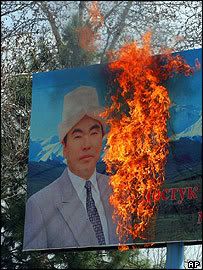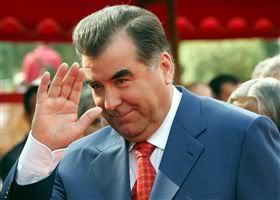A Big Week in Central Asian News: Three Events Will Demonstrate the Variety in the Region's Political Development



Next week will be a big week in news for Central Asia. Three very different events for which people have awaited for some time will finally take place. The three events, which relate to Kazakhstan, Kyrgyzstan, and Tajikistan respectively, are demonstrative of how different politics in these countries have become in the last fifteen years.
The first event, which will take place on Thursday November 2, is the planned opposition protest in Kyrgyzstan which will likely call for the resignation of President Kurmanbek Bakiyev. The protest could be a critical event for the political development of Kyrgyzstan, which has struggled to reform its government since the so-called “Tulip Revolution” of March 2005 that brought Bakiyev to power. To many who took part in the popular protests that forced Askar Akayev out of power, Bakiyev has been a disappointing leader who has not adequately attacked corruption and has hindered rather than promoted civil liberties in the country. Many who support the protests planned for November 2nd seem to hope that they will cause President Bakiyev to change his course and become the democratic revolutionary they had hoped he would be. Others, who have already lost hope in Bakiyev, are probably hoping that Bakiyev will be forced to resign and that a more enlightened leader will take over to reform the country. The most worrisome trend, however, is that many in Kyrgyzstan (and in neighboring countries) have decided that Bakiyev’s presidency merely shows that democracy is not a proper solution to Central Asia’s problems. November 2nd, therefore, is a turning point for Kyrgyzstan that will determine whether the country is actually moving towards democratic governance or whether it is losing faith in the ideal of democracy entirely.
The second event, which will take place on Friday November 3, is the worldwide premiere of Sacha Baron Cohen’s new film about the fictional Kazakhstani journalist Borat Sagdiyev. The film is unlikely to be shown in Kazakhstan, but its screening around the world will raise the country’s profile like never before. For some time, it seemed that the Kazakhstan government was obsessed with the image that the “Borat” film would cultivate of them abroad. In some ways, this obsession demonstrates the sophistication of Kazakhstan as a political entity that is concerned about its image in the international community. In other ways, however, the obsessions betray Kazakhstan’s preoccupation with the perception of politics and not their reality. Kazakhstan, even more than Putin’s Russia, is the model of managed democracy, which is a political system that favors perceptions over realities, scarecrow parties over real political competition, and controlled opposition media over public access to a real variety of opinions. Kazakhstan, however, is also at a crossroads politically. Concern over what people around the world think about “Borat” has been overshadowed by real problems in the country, ranging from the workers’ unrest in the Tengiz oil fields to the infection of children in the Shymkent area with HIV-AIDS through blood transfusions. With Kazakhstan’s citizens beginning to demand more than peace and subsistence from its government, reality may become more important than perception in the politics of the country. The premiere of the Borat film on November 3rd won’t be a turning point in Kazakhstan’s political development, but the country’s growing loss of interest in the issue may be indicative of a general shift underway that will gradually create the impetus for political reform.
The last event is at the end of the week’s long weekend in Tajikistan on Monday November 6th. As Tajikistan celebrates the 89th anniversary of the Bolshevik revolution, it will re-elect its incumbent president once more in a non-competitive election. With all viable candidates removed from the race, the election promises to be similar to the staged elections of the Soviet period. People will appear at the polling stations as a sign of loyalty to the state rather than as an expression of their political will. In this sense, the presidential elections in Tajikistan on November 6th will be yet another reminder that the country has yet to really undergo either an evolution or a revolution out of the Soviet period’s controlled political environment. Unlike in Kyrgyzstan, where the country is dealing with questions of what kind of governance the country should adopt, and unlike in Kazakhstan, where real problems of governance are forcing the state to face reality over perceptions, Tajikistan is still struggling to even create a perception of liberal democracy through a staged election. The country has yet to fully face the demons that drove it into civil war immediately after the fall of the U.S.S.R., and its citizens are far more concerned with the struggle for subsistence than with choosing their government. November 6th, therefore, is yet another reminder that Tajikistan is stuck in a world of the past, and it remains careful in its attempts to dig itself out and to face the challenges of the future.
Fifteen years ago, it would have been difficult to imagine the three news events of next week and the very different countries of Kyrgyzstan, Kazakhstan, and Tajikistan that they affect. Without even mentioning the very different realities of Uzbekistan and Turkmenistan, next week’s lead news items in Central Asia are indicative of the varied development paths that politics and governance have taken in the region. Along these lines, it is difficult to envision exactly where each of these countries will be fifteen years from now.



2 Comments:
I read asian news today I read Asian news every day
Great blog, this is really interesting blog and best platform to share such interesting articles. Primo Capital Dubai
Post a Comment
<< Home